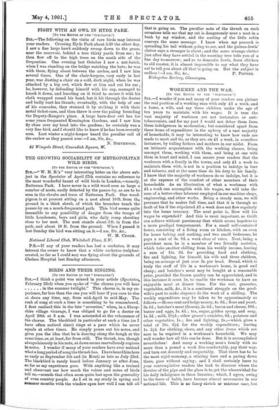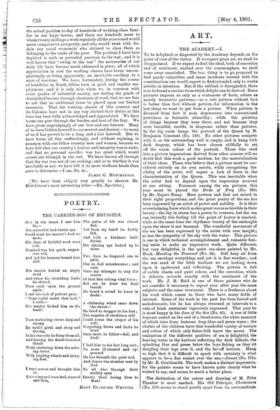WORKMEN AND THE WAR.
[TO THE EDITOR OF THE " SPECTATOR."] Srn,—I wonder if you and many of your readers can picture the real position of a working man with only £1 a week, and a home, a wife, and say three children under the age of ten years to maintain with his wages. It is true the vast majority of workmen are not teetotalers or anti- tobacconists, and for my part I would not debar them from these indulgences in moderation ; but considered apart from these items of expenditure in the upkeep of a vast majority of households, it may be interesting to know how ends are made to meet and tie, as they are, on £1 a week, in countless instances, by toiling fathers and mothers in our midst. From an intimate acquaintance with the working classes, living amongst them, working with them, and being at one with them in heart and mind, I can assure your readers that the workman with a family in the towns, and only £1 a week to maintain them with, is not in a position to indulge in beer and tobacco, and at the same time do his duty to his family. I know that the majority of workmen do so indulge, but it is at the expense of the comfort of other members of their households. As an illustration of what a workman with £1 a week can accomplish with his wages, we will take the case of a better-class labourer employed in our machine shops, engineering, and other works. Being a steady man, we will presume that he makes full time, and that it is through no fault of his if the stipulated El a week does not flow regularly into the home treasury. The next point is, How will his wages be expended? And this is most important, as thrift can achieve without parsimony that which seems hopeless to a more prodigal temperament. For a small self-contained house, consisting of a living room or kitchen, with an oven for home baking and cooking, and two small bedrooms, he pays a rent of 3s. 9d. a week clear of rates. Next, being a provident man, he is a member of two friendly societies, which take another shilling from his weekly income, leaving a sum of 15s. 3d. for providing food and clothing, fire and lighting, for himself, his wife and three children, being an average of just over 3s. per head. Bread, which is truly the staff of life in a workman's home, is good and cheap; and butcher's meat may be bought at a reasonable price, provided the frozen quality can be appreciated, and in this instance it must be, to enable the workman to have an enjoyable meal at dinner time. For the rest, groceries, vegetables, milk, &c., it is a continual struggle on the good- wife's part to make sixpence do the work of a shilling. The weekly expenditure may be taken to be approximately as follows :—House rent and lodge money, 4s. 9d. ; flour and yeast, 3s. 6d. ; butcher's meat (frozen), 2s. 6d.; bacon and cheese, 10d. ; butter and eggs, ls. 4d. ; tea, sugar, golden syrup, and soap, le. 3d. ; milk, 10Id.; other grocer's sundries, 6d.; potatoes and other vegetables, ls. ; fire and lighting, 2s.,—which gives a total of 18s. 6id. for the weekly expenditure ; leaving Is. 51d. for clothing, shoes, and any other items which are sure to be required in a workman's household. We may well wonder how all this can be done. But it is accomplished nevertheless ! And many a working man's family with no more than a pound a week live comfortably, pay their way, and turn out decently and respectably. That there has to be the most rigid economy, a stinting here and a paring down there, goes without saying ; and I shall certainly leave to your contemplative readers the task to discover where the devotee of the pipe and the glass is to get the wherewithal for his daily indulgence in these luxuries ; which, I agree, owing to the force of habit, have become almost necessaries in our national life. This is no fancy sketch or extreme case, but the actual position to-day of hundreds of working-class fami- lies in our large towns; and there are hundreds more to whom twenty shillings a week regularly all the year round would mean comparative prosperity, and who would treat with dis- dain any social economist who claimed to class them as belonging to the ranks of the poor. The position I have here depicted is such as prevailed previous to the war; and it is well known that " owing to the war" the necessaries of our daily life have become much enhanced in price; all of which appreciation in cost the working classes have borne uncom- plainingly, as being, apparently, an inevitable corollary to a state of war-time. We have, fortunately, during the course of hostilities in South Africa been in good and regular em- ployment; and it is only now, when we, in common with other grades of industrial society, are feeling the pinch of diminished income through shortness of work, that we are fain to ask that no additional taxes be placed upon our limited resources. That the working classes of this country and its Colonies have not in any way shirked their duties at this time has been fully acknowledged and appreciated. We have borne our part through the burden and heat of the fray. We have given ungrudgingly of our best and our bravest. Many of us have bidden farewell to our nearest and dearest•,—to many of us it has proved to be a long and a last farewell. But we have borne all this unflinchingly, and without repining, in common with our fellow country men and women, because we have felt that our country's honour and integrity was at stake, and that no personal sacrifice was too great which would
assure our triumph in the end. We have known all through that the war was not of our seeking ; and as to whether it was inevitable or not, we have left it to more studious heads than ours to determine.—I am, Sir, &c.,
JAMES G. Hir'reirmsorr.
[We have been obliged very greatly to shorten Mr. Hutchinson's most interesting letter.—En. Spectator.]











































 Previous page
Previous page